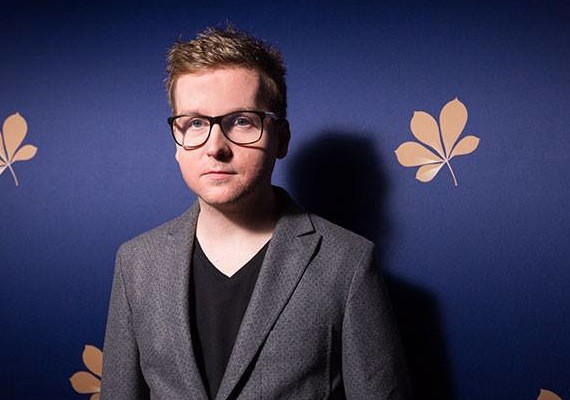Bartosz M. Kowalski • Director
"A domino effect"
- Young Polish filmmaker Bartosz M Kowalski spoke to Cineuropa about his feature film debut, Playground, which has appeared at San Sebastián and Warsaw, among others

Playground [+see also:
film review
trailer
interview: Bartosz M. Kowalski
film profile], the first feature film by Bartosz M Kowalski, was part of the official line-up of San Sebastián, Gdynia, the BFI London Film Festival and the Warsaw Film Festival’s 1-2 Competition. Cineuropa sat down with the young Polish director.
Cineuropa: Your film is based on a true story. Why did you decide to make a film about a murder committed by children?
Bartosz M Kowalski: I discovered this story by chance; you could almost say I stumbled upon the topic. I thought that, with my experience, I would have been able to resist a tale that is so atrocious it almost seems unimaginable. Nevertheless, I was so strongly shaken and shocked by the story that I had to make a film about it.
At the end of the screening, while the audience was still clapping, I had this feeling that your film was a sort of warning.
That’s exactly what Wojciech Smarzowski, the artistic supervisor of Playground, said! He also added that it was a must-see for all parents.
Yet, the act committed by the children seems to have no explanation, without saying any more, because it all just seems completely inexplicable.
Exactly. It’s normal for such an explosive act of violence to prompt us to search for the reason behind it. And, if we can’t find one, we ask ourselves if there weren’t a number of them: parenting mistakes, genetics, their friends from school, technology, the Internet...The existence of evil such as this prompts us to question if it is possible for a child to be born with a complete lack of empathy.
We begin to question the ordinariness of the evil...
Yes, in my experience, murder is generally committed following a number of little things, little details that can seem completely insignificant. I really wanted to show the characters’ everyday side, because they are just ordinary children, who didn’t really stand out from their friends, to show what normally happens from day to day. There was a domino effect, a chain of little things that led to the final scene. All 70 minutes of the film is building up to this ending.
This final scene was short almost as though it were a documentary.
It was a conscious decision. The cinematographer, Mateusz Skalski, and I definitely wanted to stage the scene without any sort of styling: there was no artificial lighting or camera movement. Any kind of styling would have cast doubt over the authenticity of the story.
Did you write the screenplay quickly, riding the wave of your initial shock at hearing the story?
The script was written in just a few days, in May. But editing and perfecting it, that took a few months. In order to truly capture the characters and the dialogues, I spent a lot of time talking to teenagers, calling upon my own memories, and useing all the information about school that I remembered. But I had to transpose this experience to the current era and its omnipresent technology, the fact we can record whatever we want, whenever we want to.
Was casting the film difficult?
I was a little worried. We were told that topic didn’t really lend itself to casting children. And, even if we found children who were able to portray the role believably, with real emotion, their parents would never allow them to appear in the film. In the end, after looking at close to 1,000 children, we found our three actors. We organised the production, both during preparation and on set, in a way that ensured the children felt safe. As far as we were concerned, they were always the first priority. We spent a lot of time together, and to take their minds off things, we went riding, camping, etc. We were like our own little family. Of course, there was also a psychologist with us.
The film’s soundtrack is very diverse. Why is that?
I love the film’s music, almost obsessively so. For my first fiction film (50 minutes), A Dream in the Making,the music was composed by Angelo Badalamenti, who is well known for his work on David Lynch’s films. For Playground, aside from the the snippets of a few of my favourite classical composers, the soundtrack was composed by Kristian Eidnes Andersen, who has previously worked with Lars von Trier. Although it is a modest film, with a relatively small budget, he accepted my invitation. It really meant a lot to me.
The audiences’ reactions to your film have been very strong: some of the viewers even left the cinemas at San Sebastián and Gdynia during the final scene.
I think that that’s all well and good. It’s an important topic. One of the three child actors, Nicolas, said that 200 people left and 1,200 stayed to watch it all. That’s not all that bad, is it?
(Translated from French)
Did you enjoy reading this article? Please subscribe to our newsletter to receive more stories like this directly in your inbox.















